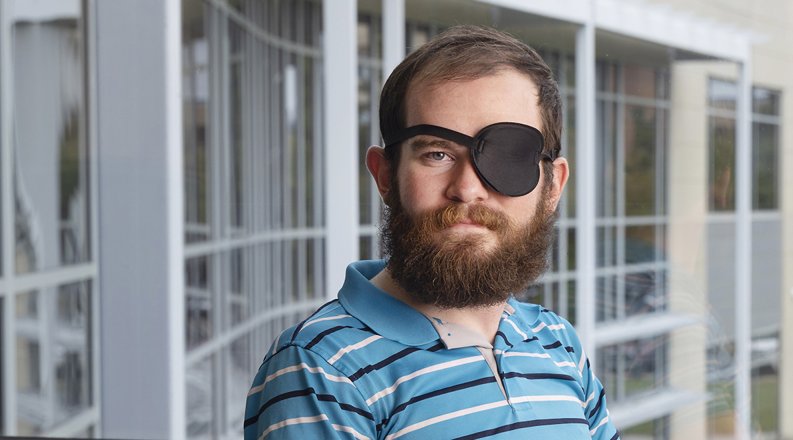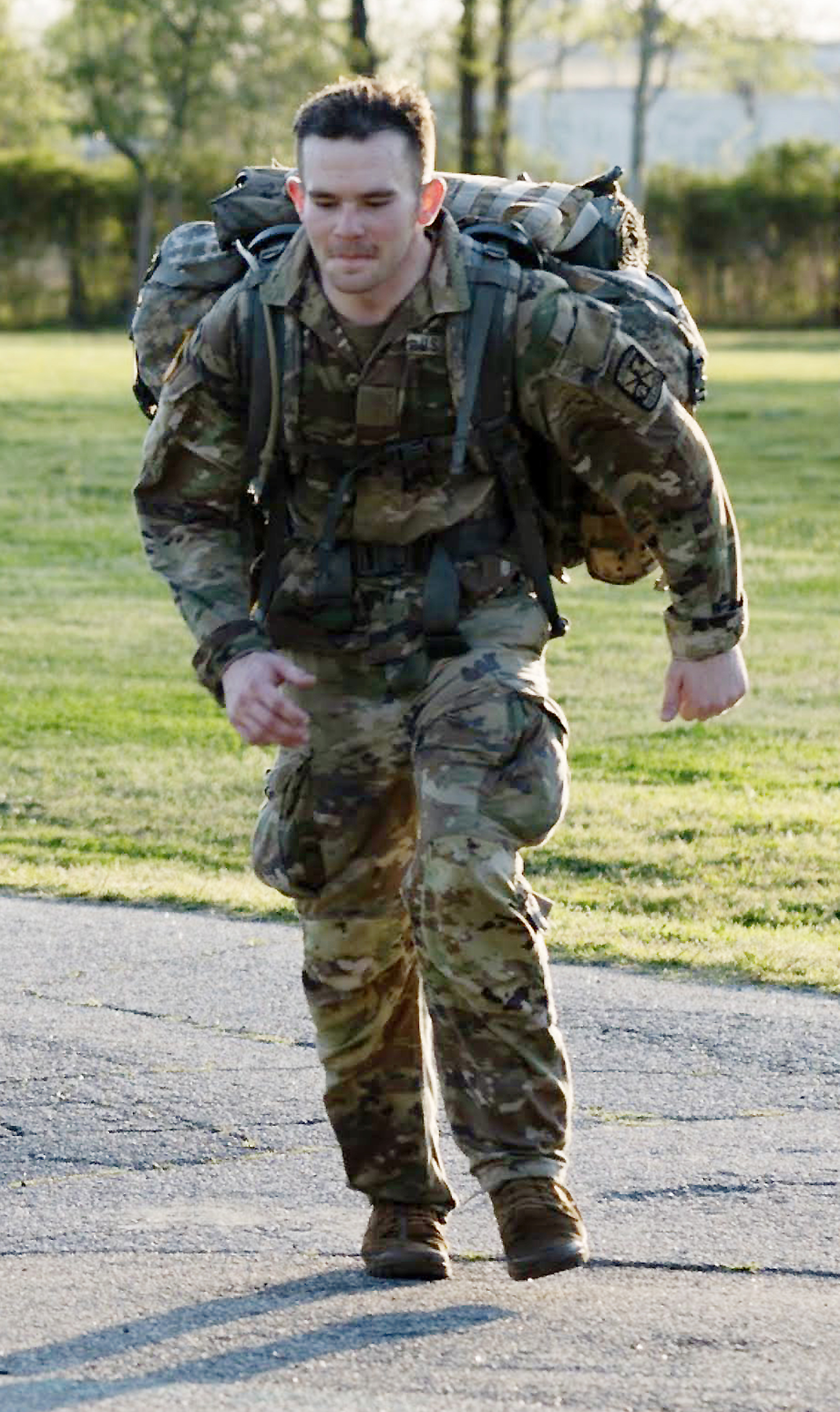In spring 2023, Eric Roberts was just living his life. “I was doing my job, doing ROTC physical training every morning, going to school and trying to stay alive,” said Roberts, a mechanical engineering technology major at Old Dominion University.
“Then I started getting these migraines.”
The migraines had persisted for about two weeks when Roberts noticed he had also become sensitive to fluorescent lighting. “I was in class in Kaufman Hall and had to wear sunglasses because I couldn’t handle the lighting,” he recalled. “That’s when I knew something was really wrong.”
After an eye doctor’s appointment revealed no clues, Roberts drove to his parents’ house in Newport News.
“As I was walking up the driveway, one of my legs went numb,” he said. “I was like, okay, forget this, I'm going to the hospital.”
A CAT scan at the emergency room revealed a 7-centimeter pilocytic astrocytoma, a type of brain tumor, pressing on his cerebellum—the part of the brain responsible for motor functions like balance, movement and speech.
The doctors were straightforward with Roberts. “If we don't get this out, you could die because it's accumulating brain fluid,” they told him.
After undergoing brain surgery and spending months in and out of the hospital, where he had to relearn how to walk and talk, Eric Roberts is now back on track to complete his degree, having only missed one semester.
Born in Dayton, Ohio, and raised in Newport News, Virginia, Roberts was homeschooled and completed most of his high school education by the age of 16. He then began dual enrollment classes at Thomas Nelson Community College (now called Virginia Peninsula Community College) and later transferred those credits to ODU.
His father, an engineer at Newport News Shipbuilding, inspired his interest in engineering. “What I appreciated was his attitude of pragmatism and finding solutions to problems,” Roberts said.
Roberts applied that same pragmatic thinking when he joined the Virginia Army National Guard at age 18. “I knew that if I wanted to go to college and do cool Army stuff, the National Guard was the way to go, because, if you're in the National Guard, you can still go to school,” he explained. “I just did what I felt would be the safest decision.”
Roberts enlisted as an 11B Infantryman and was sent to Fort Benning (now called Fort Moore) for 22 weeks of One Station Unit Training, a military training system that combines both basic combat training and advanced individual training.
He credits that training with helping him endure the physical and mental challenges of his surgery. “I survived military training, and it was tough,” he said. “I thought, ‘I’m literally going to have to die before I quit. I didn’t go through all that for nothing.’”
Roberts was assigned to the 116th Infantry Brigade Combat Team based in Lynchburg, Virginia with a group known as the “Bedford Boys.” In early 2021, his unit was called to help protect the U.S. Capitol following the Jan. 6 insurrection. He was one of more than 2,000 National Guard soldiers sworn in as special deputies by the U.S. Marshals Service.
Roberts had already begun engineering classes at ODU, so when his unit prepared for deployment, his commanding officer advised him to take an assignment in Rear Detachment—an in-state support role. This enabled Roberts to continue his education.
Roberts then enrolled in the Simultaneous Membership Program (SMP), allowing him to join Old Dominion University’s Army ROTC while still serving in the National Guard.
It was at this point, on his way to becoming a 2nd lieutenant, and in charge of over 50 recruits, that the migraines began.
After the initial and follow-up surgeries, Roberts took the rest of the semester and summer to recover. “I went to speech therapy, occupational therapy and physical therapy,” he explained. At one point, Roberts had aphasia–a language disorder that affects the ability to communicate. “It's where I speak and I think it's making sense, but it's not making sense to you.”
Throughout his recovery, Roberts relied heavily on a strong support system, which included his parents, their friends, ODU professors and his church community. “There was never a time when I was alone in the hospital,” Roberts said. “My parents, especially, helped me through every step.”
At ODU, Nathan Luetke, master lecturer and advisor in the Department of Engineering Technology, directed Roberts to ODU Cares, which helped him put his courses on hold while he recovered.
“He was with me every step of the way,” Roberts said of Luetke. “He really helped me get back on track.”
Luetke was confident that Roberts would succeed. “I know that his ROTC background likely played a big role in his recovery,” Luetke said. “Eric wanted to join the military and make a career out of it and was devastated when he was discharged from ROTC due to medical reasons. He’s not a quitter, so now his degree is his focus and he won’t let the brain tumor stop him from finishing it.”
Today, Roberts is adjusting to a new normal. He still has a shunt in his head to drain spinal fluid. He also wears an eyepatch because his eyes—although he has 20/20 vision—don’t work together, giving him double vision.
Roberts has also noticed changes in his personality, “I would say I've become more cordial at times, but also become more irritated,” he explained. “My highs and lows got more exaggerated.”
Outside of school, he continues to do the things he did before: volunteer for his church, participate in WWII reenactments and play video games. He wanted to get back into social activities, so he recently joined the ODU Engineering Ambassadors.
As for the future, Roberts is looking for something he loves to do and where he can be of service. “Honestly, it goes back to bringing value and feeling like I belong,” he said. “I really loved the military. Now, I’m hoping to find that in engineering.”




